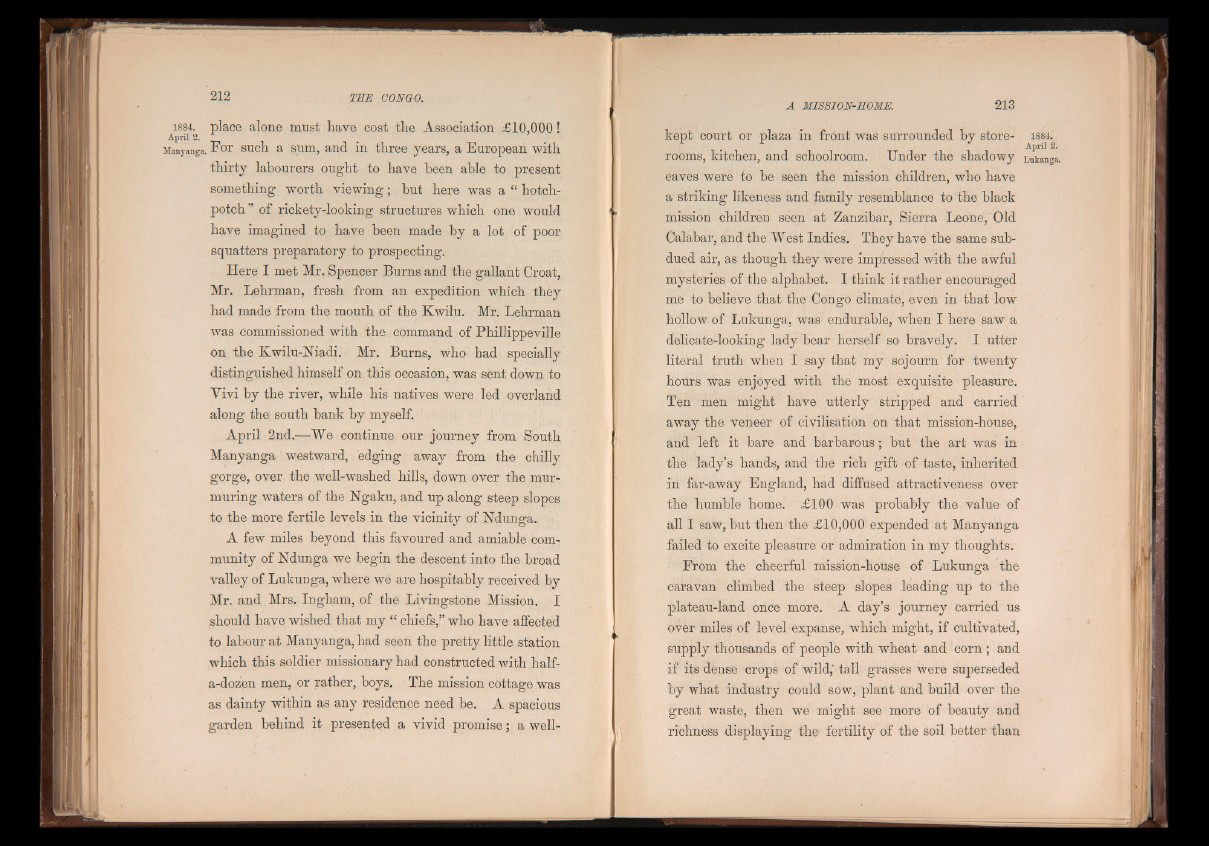
1884. place alone must have cost the Association £10,000!
April 2.
Manyanga. For such a sum, and in three years, a European with
thirty labourers ought to have been able to present
something worth viewing; hut here was a “ hotchpotch
” of rickety-looking structures which one would
have imagined to have been made by a lot of poor
squatters preparatory to prospecting.
Here I met Mr. Spencer Burns and the gallant Croat,
Mr. Lehrman, fresh from an expedition which they
had made from the mouth of the Kwilu. Mr. Lehrman
was commissioned with the command of Phillippeville
on the Kwilu-Niadi. Mr. Burns, who had specially
distinguished himself on this occasion, was sent down to
Vivi by the river, while his natives were led overland
along the south hank by myself.
April 2nd.—We continue our journey from South
Manyanga westward, edging away from the chilly
gorge, over the well-washed hills, down over the murmuring
waters of the Ngaku, and up along steep slopes
to the more fertile levels in the vicinity of Mdunga.
A few miles beyond this favoured and amiable community
of Ndunga we begin the descent into the broad
valley of Lukunga, where we are hospitably received by
Mr. and Mrs. Ingham, of the Livingstone Mission. I
should have wished that my “ chiefs,” who have affected
to labour at Manyanga, had seen the pretty little station
which this soldier missionary had constructed with half-
a-dozen men, or rather, boys. The mission cottage was
as dainty within as any residence need be. A spacious
garden behind it presented a vivid promise; a wellkept
court or plaza in front was surrounded by storerooms,
kitchen, and schoolroom. Under the shadowy
eaves were to be seen the mission children, who have
a striking likeness and family resemblance to the black
mission children seen at Zanzibar, Sierra Leone, Old
Calabar, and the West Indies. They have the same subdued
air, as though they were impressed with the awful
Lukanga.
mysteries of the alphabet. I think it rather encouraged
me to believe that the Congo climate, even in that low
hollow of Lukunga, was endurable, when I here saw a
delicate-looking lady bear herself so bravely. I utter
literal truth when I say that my sojourn for twenty
hours was enjoyed with the most exquisite pleasure.
Ten men might have utterly stripped and carried
away the veneer of civilisation on that mission-house,
and left it bare and barbarous; but the art was in
the lady’s hands, and the rich gift of taste, inherited
in far-away England, had diffused attractiveness over
the humble home. £100 was probably the value of
all I saw, but then the £10,000 expended at Manyanga
failed to excite pleasure or admiration in my thoughts.
From the cheerful mission-house of Lukunga the
caravan climbed the steep slopes leading up to the
plateau-land once more. A day’s journey carried us
over miles of level expanse, which might, if cultivated,
supply thousands of people with wheat and corn ; and
if its dense crops of wild,' tall grasses were superseded
by what industry could sow, plant and build over the
great waste, then we might see more of beauty and
richness displaying the fertility of the soil better than